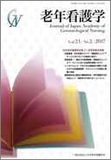Japanese
English
- 販売していません
- Abstract 文献概要
- 参考文献 Reference
抄録
本研究は,認知症を有する高齢慢性心不全患者の家族がとらえる心不全の増悪徴候を明らかにすることを目的とした.対象者は,認知症を有する高齢慢性心不全患者と同居する家族10人として半構成的面接を行いデータ収集し,質的記述的に分析した.認知症を有する高齢慢性心不全患者の家族がとらえた心不全増悪徴候として,【目にみえる身体の変化がある】【発話,身支度,移動がままならなくなる】【その人なりの身体の不調を表すようになる】の3つのカテゴリーが抽出された.家族がとらえる心不全の増悪徴候は,家族が患者のいつもの言動や生活状況を知っているからこそ気づくことのできる些細な変化や異和感からの気づきであった.認知症高齢患者の心不全の重症化を予防していくためには,本研究で見出された3つのカテゴリーを念頭において,家族がとらえているその患者特有の心不全増悪徴候を家族と共に確認することで,重症化しない早い段階で受診につなげてもらえるような支援をしていくことが必要であると考える.
The purpose of the present study is to clarify the signs of exacerbation of heart failure detected by family caregivers of the heart failure elderly with dementia. Semi-structured interviews were conducted with 10 family caregivers living with demented elderly persons suffering from chronic heart failure. The details of the interviews were analyzed in a qualitative and descriptive manner. Consequently, as the signs of exacerbation of heart failure detected by the family caregivers, the following three categories were extracted: ‘presence of visible physical changes’, ‘having difficulty in speaking, dressing and moving’, and ‘appearance of physical disorder in the patient's own manner’. Family caregivers living with patients who were having difficulty in recognizing and indicating their intentions could detect signs of exacerbation of heart failure. These signs were minor changes or subtle differences that only the family caregivers knowing the patients' daily speech habits and living conditions could notice. Taking a collaborative approach with family caregivers, we should confirm the patient-specific signs of exacerbation of heart failure detected by family caregivers. In this manner, we should provide appropriate support that prompts patients to visit a hospital and prevent aggravation of heart failure.
Copyright © 2017, Japan Academy of Gerontological Nursing All rights reserved.


